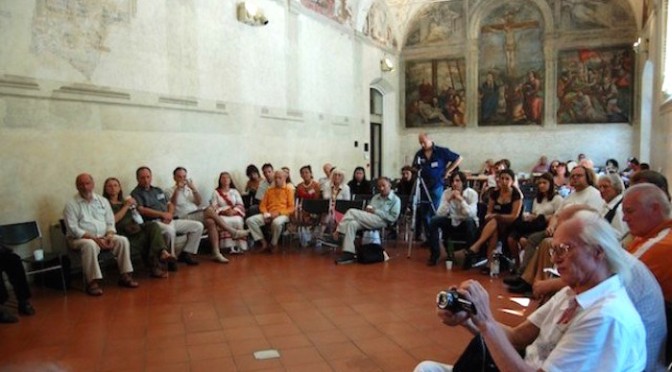As with most other indigenous ethnic or folk religions, the ancestors of modern-day Scandinavians actually had no specific name for their religion. In those ancient times, when the whole community lived by one same religion, there was no need for a “name,” because there were simply no other religions known to them at the time. Continue reading Nine Noble Virtues of Ásatrú
ETHICS OF BALTIC RELIGION
By Jonas Trinkūnas
The Lithuanians’ ancient religion is inseparable from homeland, ancestors’ land, language; it takes its root in high antiquity and our ancestors are its originators. The ancestors pass on their most sacred knowledge to us as a traditional culture with its customs, morality, folk songs, etc. The religion itself formed as an expression of the sacrality of cultural traditions, closely related with the moral outlook. Continue reading ETHICS OF BALTIC RELIGION
THREE BASES FOR A PAGAN TRADITIONAL ETHIC IN THE PRESENT WORLD
At the ECER congress, Bologna 26-29th August 2010 c.e.
Warning: In these pages I make a wide use of the words “Pagan” and “Paganism”, even though I know that these words aren’t adopted or approved by every group here. But since I’m going to talk about some general principles that should be common to several ancient non-monotheistic traditions and since here in Italy we are used to hear many people saying that Italian tradition is only catholic tradition, I’ve decided to use the word “pagan” only to mean a tradition coming from these ancient non-monotheistic religions. Continue reading THREE BASES FOR A PAGAN TRADITIONAL ETHIC IN THE PRESENT WORLD
Ethics, moral and virtue in the context of the germanic pagan folks
By Frank Wilke
The term ethics (old Greek ethos) designates the habit, custom, usages and kind of sense of a folk. Thus the ethics is the science of correct or wrong acting and wanting (of an individual, a folk or a society) and struggles for the attempt of a clarifying of the elementary question, what good and bad is. Additionally that central, most-discussed subsection of philosophy, which concerns practically each humans, includes the terms of the individual human freedom, the social standards, the morality and the moral itself in general. Continue reading Ethics, moral and virtue in the context of the germanic pagan folks
Bologne ECER Declaration-2, 29th of August, 2010
Bologne ECER Declaration-2, 29th of August, 2010
The WCER delegates who gathered in Bologna, Italy (2010.08. 26-29) at our yearly conference came to the decision that from now on our name should be changed to European Congress of Ethnic Religions. The word “World” should be “European” instead. Why did we decide to focus only on Europe? Thirteen years have passed since the creation of the Congress in 1998 in Vilnius, Lithuania. Every year, conferences were organized in various European countries and it turned out that that the Congress actually unites only people of European indigenous traditions, even though the congress is open to all other traditions. Continue reading Bologne ECER Declaration-2, 29th of August, 2010
Video presentation from the ECER Congress in Bologna which was held 26 to 29 August 2010
Photo taken in 26 August of 2010, the first day of the ECER ( European Congress of Ethnic Religions ) which was held 26 to 29 August 2010 at the Hall of Baraccano, Bologna.
Photos and editing by Sarah Bernini
The Traditional Rituals in the Slavonic Ethnic Religion community THE GREAT FIRE (Ukraine)
The Slavonic Ethnic religion community THE GREAT FIRE made the traditional the rituals were performed.
Third International Conference and Gathering of Elders Renaissance of Ancient Traditions: Challenges and Solutions
31st Jan to 5th Feb. 2009, Nagpur, India
ICCS (International Center for Cultural Studies) is organizing this conference in collaboration with the World Congress of Ethnic religions (wcer.org), the National Council of Elders Mayas, Xinca and Garifuna of Guatemala. Continue reading Third International Conference and Gathering of Elders Renaissance of Ancient Traditions: Challenges and Solutions
The 2008 WCER Congress Poland, Poznan, Glogow, (20th – 22nd August 2008)
The 2008 WCER Congress (20th – 22nd August 2008)
Place: Poland, Poznan, Glogow, Castle Rothenhorn/Czerwony Róg
Theme: Ethnic Religions in Modern Europe Continue reading The 2008 WCER Congress Poland, Poznan, Glogow, (20th – 22nd August 2008)
The 2007 WCER Congress in Latvia – Riga (19th – 21th June 2007)
The 2007 WCER Congress (19th – 21 th June 2007)
Place : in Latvia – Riga, Jurmala, Sigulda.
Theme: „The spirit will see new light in the turn of ages” (Rainis)
Ethnic religions – national spiritual base
The central axle of the immaterial heritage of every nation is its ethnic religion – the national spiritual base that should become the spiritual base of humankind in future. Continue reading The 2007 WCER Congress in Latvia – Riga (19th – 21th June 2007)
The 2006 WCER Congress, Jaipur, Rajasthan, India (5th – 10th February 2006)
The 2006 WCER Congress (5th – 10 th February 2006)
Place : H. N. Mathur Institute of Public Administration, Nehru Road, Jaipur, Rajasthan, India
Theme: “Spirituality Beyond Religions” 9th Conference of the WCER in Jaipur – India
Continue reading The 2006 WCER Congress, Jaipur, Rajasthan, India (5th – 10th February 2006)
The 2005 WCER Congress (8th – 10th June 2005)
The 2005 WCER Congress (8th – 10 th June 2005)
Invitation and Programme
Place : Arenbergschouwburg, Arenbergstraat 28, 2000 Antwerp, Belgium
Theme: “Spirituality and tradition in an anti-traditional world”
Continue reading The 2005 WCER Congress (8th – 10th June 2005)
